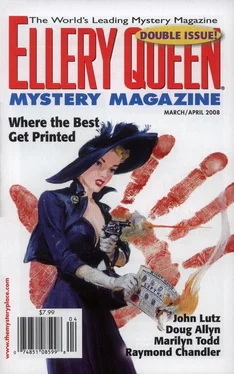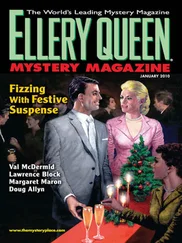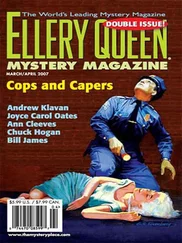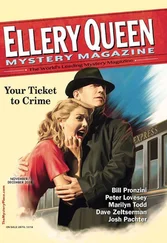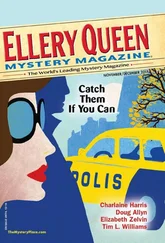Doug Allyn - Ellery Queen’s Mystery Magazine. Vol. 131, No. 3 & 4. Whole No. 799 & 800, March/April 2008
Здесь есть возможность читать онлайн «Doug Allyn - Ellery Queen’s Mystery Magazine. Vol. 131, No. 3 & 4. Whole No. 799 & 800, March/April 2008» весь текст электронной книги совершенно бесплатно (целиком полную версию без сокращений). В некоторых случаях можно слушать аудио, скачать через торрент в формате fb2 и присутствует краткое содержание. Город: New York, Год выпуска: 2008, ISBN: 2008, Издательство: Dell Magazines, Жанр: Детектив, на английском языке. Описание произведения, (предисловие) а так же отзывы посетителей доступны на портале библиотеки ЛибКат.
- Название:Ellery Queen’s Mystery Magazine. Vol. 131, No. 3 & 4. Whole No. 799 & 800, March/April 2008
- Автор:
- Издательство:Dell Magazines
- Жанр:
- Год:2008
- Город:New York
- ISBN:ISSN 0013-6328
- Рейтинг книги:5 / 5. Голосов: 1
-
Избранное:Добавить в избранное
- Отзывы:
-
Ваша оценка:
- 100
- 1
- 2
- 3
- 4
- 5
Ellery Queen’s Mystery Magazine. Vol. 131, No. 3 & 4. Whole No. 799 & 800, March/April 2008: краткое содержание, описание и аннотация
Предлагаем к чтению аннотацию, описание, краткое содержание или предисловие (зависит от того, что написал сам автор книги «Ellery Queen’s Mystery Magazine. Vol. 131, No. 3 & 4. Whole No. 799 & 800, March/April 2008»). Если вы не нашли необходимую информацию о книге — напишите в комментариях, мы постараемся отыскать её.
Ellery Queen’s Mystery Magazine. Vol. 131, No. 3 & 4. Whole No. 799 & 800, March/April 2008 — читать онлайн бесплатно полную книгу (весь текст) целиком
Ниже представлен текст книги, разбитый по страницам. Система сохранения места последней прочитанной страницы, позволяет с удобством читать онлайн бесплатно книгу «Ellery Queen’s Mystery Magazine. Vol. 131, No. 3 & 4. Whole No. 799 & 800, March/April 2008», без необходимости каждый раз заново искать на чём Вы остановились. Поставьте закладку, и сможете в любой момент перейти на страницу, на которой закончили чтение.
Интервал:
Закладка:
Words were missing.
Rimmer flattened the page. Entire phrases had been cut out, leaving rectangular holes all over the paper. He grabbed another crumpled ball. It, too, had been vandalized by somebody’s scissors. He snatched each one and tore it open; they were all ravaged. Finally, Rimmer noticed unwrinkled sheets at the bottom of the pile.
The cut-out phrases composed the text, taped down to form paragraphs. His words, made new again, by careful arrangement. Trite phrases and stale observations had been left behind. Some benevolent elf had come in the night, read his poor draft, and lifted the gold from the dross. A gift. Rimmer gasped and put a hand against his breastbone.
He stumbled outside, expecting the sun to be beaming. Instead, raindrops streamed down his hair and face, trickled under his collar. Rimmer wiped his cheeks and let a laugh work its way from his belly to his lips. He felt giddy. He wanted to roll in the mud and kick his feet in the air. Instead, he picked up the garden spade that leaned against the house and worked the tip a little way into the earth. The soil squelched.
“Good, yes?” Elsa’s voice.
Still grinning, Rimmer turned and said, “Yes, I suppose a little dirt might be good for me—”
She stood in the doorway, the paper with the taped scraps in her hand. She extended the paper to him, an offering. “Better now?”
His mind froze. He could feel that his face had frozen, too, stuck in a half-smile. This servant, whose mother tongue was gibberish, had tampered with his work? He should laugh it off, pour her a nice glass of scotch, and toast her health. But instead he felt, or rather, noticed, the way rage distilled inside his gut. She had trespassed. He watched his hands grip the handle of the spade, swing it round in a perfect arc, and crack it against her skull. She toppled forward, stiff as a post. Water rippled in the puddles, reflecting more water coming from the sky. He stepped over her body to pick up the paper and slammed the door to the house.
He came out again in a few minutes, now wearing his old writing duds — galoshes and apron and hat. He took the spade and walked to the back of the yard. The mulch bin, a large one, was covered against the rain. Some of the compost would be relatively dry, and it stunk to heaven anyway. He lifted the spade over the bin’s low wall, put his shoulder against the handle, and started to dig.
The rain stopped three days later. When the phone rang early in the morning, Rimmer picked it up obediently, certain that the sheriff was calling to order him to turn himself in. Time to take his medicine.
“Maxwell? Tina. Love the new work, thanks for faxing it along. Poignant. Gripping. Just like your old stuff. Is there more? Send it on, baby, and we’ll get a book out in time for next spring... You there?”
Dust coated the house. Motes swam in the sunbeams. Every dish was in the sink. How had she kept stains off the floor? At night, cockroaches scuttled in the pantry and mice rustled in the walls.
Rimmer went to Elsa’s room and stood by the bed. For three years, he’d never set foot inside; he’d even avoided glancing through the open door on the way to the bathroom. The cover was smooth. She’d hung a cross above the bed. The dresser held a jewelry box with a strand of pearls and rings he’d never seen her wear. He found a stack of letters in a drawer, all in Dutch. The dates were at least a decade old.
The nightstand held a lamp, a coaster for her water glass, and a small radio. Rimmer turned it on, but could barely hear its whispering. He found the volume knob and twisted.
“Welcome to W-EVE, house of the Lord on the airwaves. Coming up, it’s Reverend Peach, here to offer comfort and words of redemp—”
He switched it off. Had she been here each morning, quietly listening to the same show? She could have joined him. They could have shared a cup of coffee. Talked about his writing or her errands for the day. But she had stayed in her room because she knew that he wished to be alone. Hadn’t he always said so? She must have slipped out to his desk after he went to bed, to read what he had tossed away. And one night, not so long ago, she had seen his struggle with words and cleansed them.
Maxwell Rimmer shuffled out to his typewriter and sat. He heard his own breathing, but could not feel his body. It moved like a puppet. He ordered his fingers to rest upon the keys and tapped out the words: I have lived in paradise .
© 2008 by Kate Barsotti
An Appointment Up the Mountain
by Robert S. Levinson
Back with an offbeat piece in a semi-thriller mode is California’s Robert S. Levinson. The story stars Clegg, the sympathetic bad guy from his celebrated novel Hot Paint , who, this time out, is invited to a dangerous meeting with a Nazi sympathizer at the top of a Bavarian mountain. Mr. Levinson’s latest novel is Where the Lies Begin (Five Star Press), a book the Baltimore Sun hailed as “(An) ever-surprising, character-rich thriller.”
Clegg stopped at Dachau before heading up the mountain.
The camp was a place he had spent years avoiding, never anxious to confront the horrors it represented to him.
Why today was different he wasn’t sure.
Maybe because he had to be close on business and seeing Dachau would salve his conscience by showing him the reality of death beyond any he had caused after taking up killing as a way of life.
He stayed there longer than he meant to and, consequently, didn’t reach the village in the Bavarian Alps until midafternoon.
The village was small, as quaint and clean as a stage set in one of those operettas like The Student Prince, or something newer, like The Sound of Music. He pictured Julie Andrews in the movie version, in a place like this, leading the precocious von Trapp kids and their overbearing father to first place in the annual talent contest, then over the Alps to escape from the Nazis, and was stumbling through the lyrics of “So Long, Farewell” when he arrived at Von Harbou Hall.
The hall was easy to find, the only two-story building on the broad road, exactly as advertised by Dr. Von Harbou, who had to be the man pacing out front, checking the watch attached by a heavy gold chain to the vest pocket of his conservative three-piece black suit.
Von Harbou was in his mid to late sixties and small of stature, with a full head of white hair worn in a tight crew cut. His irritated expression converted to a questionable smile as Clegg pulled up in front and cut the engine, and he snapped the watch shut and returned it to his vest, double-checking the pocket with a couple of pats on his way to the rented cocoa-colored Mercedes.
“Herr Clegg?”
Clegg nodded as he stepped from the car and took Von Harbou’s outstretched hand.
“Sorry to be late,” Clegg said, not sorry at all, but aware an apology would appeal to a German’s passion for promptness. “An honor, Herr Doktor,” Clegg said, meaning it less than his apology.
“Mine, indeed,” Von Harbou said, exposing more of his tiny, tobacco-stained teeth, the smile still too rich to be sincere. “I was expecting you by now and was getting worried. Sometimes, the road, it can be tricky-dangerous for someone who doesn’t know it well.” The German’s English accent was clipped, but otherwise almost faultless.
“I stopped briefly in Munich, to see the Frauenkircheand the Theatinerkirche, then along the way to admire the views. The beauty of your countryside got the best of me.”
“Yes, especially this time of the year. The higher you get, the more beautiful. The unspoiled beauty of nature. Her palette on full display, past even a landscape by Rubens, a Degas, a—”
Читать дальшеИнтервал:
Закладка:
Похожие книги на «Ellery Queen’s Mystery Magazine. Vol. 131, No. 3 & 4. Whole No. 799 & 800, March/April 2008»
Представляем Вашему вниманию похожие книги на «Ellery Queen’s Mystery Magazine. Vol. 131, No. 3 & 4. Whole No. 799 & 800, March/April 2008» списком для выбора. Мы отобрали схожую по названию и смыслу литературу в надежде предоставить читателям больше вариантов отыскать новые, интересные, ещё непрочитанные произведения.
Обсуждение, отзывы о книге «Ellery Queen’s Mystery Magazine. Vol. 131, No. 3 & 4. Whole No. 799 & 800, March/April 2008» и просто собственные мнения читателей. Оставьте ваши комментарии, напишите, что Вы думаете о произведении, его смысле или главных героях. Укажите что конкретно понравилось, а что нет, и почему Вы так считаете.
